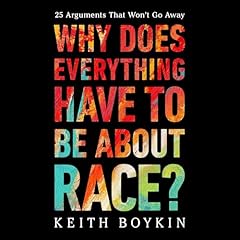
White Rage
The Unspoken Truth of Our Racial Divide
No se pudo agregar al carrito
Add to Cart failed.
Error al Agregar a Lista de Deseos.
Error al eliminar de la lista de deseos.
Error al añadir a tu biblioteca
Error al seguir el podcast
Error al dejar de seguir el podcast
 Exclusivo para miembros Prime: ¿Nuevo en Audible? Obtén 2 audiolibros gratis con tu prueba.
Exclusivo para miembros Prime: ¿Nuevo en Audible? Obtén 2 audiolibros gratis con tu prueba.Compra ahora por $17.33
-
Narrado por:
-
Pamela Gibson
-
De:
-
Carol Anderson
National Book Critics Circle Award winner, Criticism, 2016.
As Ferguson, Missouri, erupted in August 2014 and media commentators across the ideological spectrum referred to the angry response of African Americans as 'black rage', historian Carol Anderson wrote a remarkable op-ed in the Washington Post showing that this was, instead, 'white rage at work. With so much attention on the flames,' she wrote, 'everyone had ignored the kindling.'
Since 1865 and the passage of the Thirteenth Amendment, every time African Americans have made advances towards full participation in our democracy, white reaction has fueled a deliberate and relentless rollback of their gains. The end of the Civil War and Reconstruction was greeted with the Black Codes and Jim Crow; the Supreme Court's landmark 1954 Brown v. Board of Education decision was met with the shutting down of public schools throughout the South while taxpayer dollars financed segregated white private schools; the Civil Rights Act of 1964 and Voting Rights Act of 1965 triggered a coded but powerful response: the so-called Southern Strategy and the War on Drugs that disenfranchised millions of African Americans while propelling presidents Nixon and Reagan into the White House.
Carefully linking these and other historical flash points when social progress for African Americans was countered by deliberate and cleverly crafted opposition, Anderson pulls back the veil that has long covered actions made in the name of protecting democracy, fiscal responsibility, or protection against fraud, rendering visible the long lineage of white rage.
Compelling and dramatic in the unimpeachable history it relates, White Rage will add an important new dimension to the national conversation about race in America.
©2016 Carol Anderson (P)2016 Audible, LtdLos oyentes también disfrutaron:




















Reseñas de la Crítica
"Narrator Pamela Gibson perfectly conveys the insightful research and writing in this book about civil rights in the U.S. by an Emory University historian. Anderson contends that when African-Americans make even the slightest progress, a subtle, almost invisible, white rage in the form of opposition reverses what little progress has been made. An example is the current suppression of Black votes under the guise of voter fraud prevention. Gibson's delivery registers rage and compassion where appropriate. No one - from Lincoln to Trump - escapes criticism. Hard truths and supporting citations are clearly stated, leaving no confusion for listeners. Also, Gibson ably presents Anderson's unexpected humor, for example, when she talks about the current paralysis of the U.S. Senate." (AudioFile Magazine)
Las personas que vieron esto también vieron:


















Pick up your Torch
Se ha producido un error. Vuelve a intentarlo dentro de unos minutos.
White Rage: driven, dramatic, a must read
Se ha producido un error. Vuelve a intentarlo dentro de unos minutos.
Nevertheless, there is a disconnect, as the title and the analysis focuses upon White Rage, while most of the actual examples show the clear, cold, calculating, clever, subversive, cloaked, strategic plans of the oppressors. White Rage is not the source of the problem, but a tool used by these oppressors not to continue racism, but to maintain wealth and power.
The book ends with Imagining America which does not continue these racist policies. I am not optimistic that following the ideas in this book and imagining a bright future will get the job done.
I vastly prefer the practical principles of antiracism set out in Stamped From the Beginning and How to be an Antiracist.
The narration was good, but a little dry for this material.
Good Brief History of Post War Oppression
Se ha producido un error. Vuelve a intentarlo dentro de unos minutos.
Totally Wow!!!
Se ha producido un error. Vuelve a intentarlo dentro de unos minutos.
An outstanding work
Se ha producido un error. Vuelve a intentarlo dentro de unos minutos.


